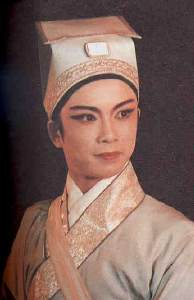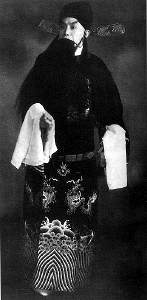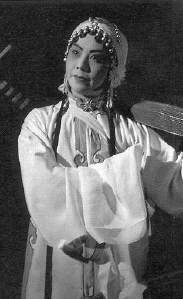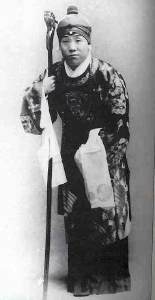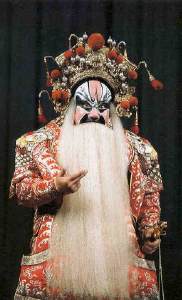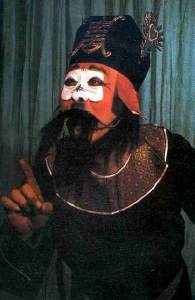Sinified Shakespeare
Shakespeare in China -- page 5 | next
Huaju, or spoken drama, as an imported theatrical form, is still widely regarded as the legitimate vehicle for Shakespeare in China. Yet Shakespeare has also been adapted into traditional Chinese music theatre, xiqu which literally means "theatre melody," although many Chinese Shakespeareans and practitioners reject the notion that Shakespeare can be accommodated in such a "feudal theatrical form." Notwithstanding the major conceptual differences between Shakespeare and Chinese music theatre, striking similarities also exist between them -- not only as regards the aspects of cultural familiarity perceived by Lin Shu in 1904, but also in terms of stagecraft where both Shakespeare and the traditional Chinese genres excel in exploiting the flexibility of the stage and in their understanding of the theatre and the audience. Further, what Mnouchkine calls "Shakespeare's ideological neutrality" [Note 11] makes it more appropriate to adapt Shakespeare than any other Western playwright. There have been over twenty Chinese operatic productions in fifteen local genres based on eleven Shakespeare plays.
The Chinese indigenous genres exemplify "total theatre" with "stories uttered in the form of song and dance." While singing tends to be what matters most to audiences, dance is also indispensable and covers a wide range of physical expression: gesturing, posing, miming and martial arts. Instrumental music and percussion necessarily have a vital function. All these aspects are integrated under a complex and hierarchically codified system that is referred to as conventionalization (chengshi). There are certain modes, patterns or rules that practitioners have to follow. Role categorization is a central feature of this system, as different role types have specific requirements for voice, gestures, body movements, make-up and costuming. There are basically four main types: sheng (male role), dan (female role), jing (male painted-face) [Note 12] and chou (the clown) which all have their own sub-types.
Character types
Each local theatre has modified forms, and sometimes different names, for these role types. Hence the division of roles is based on sex, age and performing speciality. Chinese theatregoers have their own preferred role types, particular schools of the role type and relevant repertoire to follow.
On the traditional Chinese stage, the aesthetic purpose is not Aristotelian mimesis. There is rarely any concern with the accurate reproduction of outside reality. Rather, attention in this theatre is devoted to the expression of the characters' feelings through the physical aspects of the performance in accordance with the recognized conventions. These elements require performers to master all four of the fundamental skills: singing, recitation, acting and dance (including martial arts).
An example
To illustrate the problems and possibilities of successful sinified adaptations it will be helpful to examine in some detail a scene from Blood-stained Hands (1986), a significant adaptation of Macbeth in the kunju genre. Kunju is one of the oldest genres, and flourished in the same period as the English Elizabethan theatre. It has the strictest rhythmic conventions for its music and dance. The adaptation was staged in the mode of a Chinese play with Chinese characters. The character of Ma Pei (Macbeth) belonged to a distinct role type of mo, for middle-aged or old men, which only exists in kunju and other ancient genres. The extract taken here is the kunju equivalent of the dagger scene, although in the adaptation the dagger has been transformed into a famous ancient sword, the Dragon Spring. This sword has been bestowed by the Emperor on Ma Pei for saving the Emperor and the country from the disaster of usurpation. Now Ma Pei is going to murder the legitimate Emperor with this sword. (video)
The episode commences on an almost empty stage. The two guards, having been plied with wine by Tie Shi (literally Iron Lady, [Note 13] Lady Macbeth), lie on the floor in a corner and fall asleep. Three light and slow strikes of a gong can be heard, which conventionally indicate midnight. Silence again. Suddenly the percussion starts up and Ma Pei enters, on his way to assassinate the Emperor. He carries the sword that he received in honour from the Emperor the previous day. He dashes forward, tightens his cuffs, adjusts his helmet and kneels down to pray, beseeching Heaven to help him in this enterprise. He then walks quickly towards the royal chamber, raises the sword, but suddenly hesitates. He stands still as if in a trance, holding his sword above his head. The sword reminds him that he is about to perpetrate a crime. His eyes move rapidly from side to side, and his face reveals his conflicting emotions. His resolve to kill the Emperor and usurp power becomes paralysed by his sense that this is evil. He sings:
The tides in my heart are suddenly rising as I glance at this Dragon Spring sword,
In the twinkling of an eye the person who presented me with this sword will be killed by it.
Oh, why am I so distracted at the last moment?
Everything is blurred and I don't know where I am.
He stares into space. He sees another imaginary sword in the flickering shadows of the candles, and he almost gives up:
Ah!
What is that flickering in front of my eyes?
Another Dragon Spring.
It is clanging in the sky.
Dripping with blood, the sharp blade is shining!
It is changing, now long, now short,
Sometimes half of it appears, sometimes it hides.
The sword is slipping away from my grip.
It makes the people who work with their minds lose their minds.
Chorus It makes the people who work with their minds lose their minds.
Ma Pei It makes the people who work with their hearts break their hearts.
Chorus It makes the people who work with their hearts break their hearts.
Ma Pei It makes the people who work with their muscle gain nothing.
Chorus It makes the people who work with their muscle gain nothing.
Then his wife's voice is heard: "The honourable imperial throne; the dragon bed is occupied by the tiger. This is an order from God; it will be inauspicious if you defy it." In the previous act when the couple plotted the conspiracy, Tie Shi told her husband that on the night he met the three witches, she had a strange dream. In it, she saw a tiger sitting in the dragon imperial bed. This dream is interpreted as an omen for seizing the throne, since in Chinese mythology the dragon symbolizes the emperor's power while the tiger is merely king of the animals.
Encouraged by his wife's dream and her brave words, Ma Pei cannot resist the temptation. The aria continues:
Auspicious omens prophesied good luck, Dimly, the Dragon Spring [sword] given to me by God is pointing the way.
The imperial throne is nearly in my hands and I shouldn't hesitate,
By giving me my dear and comely wife,
God has helped me.
I hope that we two will build our own endeavour with one heart and mind, then I will be Emperor and she my imperial Queen. [Note 14]
Ji Zhenhua, the performer playing Ma Pei, brought home to the audience his feelings through expressive aria singing. For example, he used an extremely quiet voice and a slow pace to sing the word "glance" in the first line. The lingering whispering sound revealed his hesitation, and made a sharp contrast to the later rising and fast melody. During Ma Pei's twenty-four-line aria, Ji Zhenhua did not stand still concentrating on his voice, but enacted highly demanding stage conventions. Using different sets of body movements like turning, bending and swaying, Ji made the audience really see the invisible sword that Ma Pei imagined. It was sometimes in front of him and sometimes behind, and Ji's agile movements demonstrated both his desire to seize it and his failure to do so.
In the traditional music theatre, the magnificent costuming and exaggerated make-up (Ma Pei's helmet, armour, long beard, and the highlighted and lifted eyes and eyebrows) are not only signs for identifying the character's status and nature, but also assist the performer in his acting and his projection of the character. An inseparable part of Ji's performance was the way he brandished his sword, shook the red pompoms on his helmet, fingered and waved his long beard, gestured and used steps of many different kinds. The eyes and eyebrows lifted by a long strap inside the helmet further accentuated the striking changes in his facial expression. These various physical movements in conjunction with the aria singing effectively externalized Ma Pei's internal struggle.
Interaction between Shakespeare and indigenous Chinese theatre
Ma Pei's sword scene well illustrates the basic characteristics of the traditional Chinese theatre, and also some of the problems in adapting a Shakespeare play into a Chinese musical form. The most obvious issue is that the adapters have to decide when and where to have singing, and to create suitable situations for arias. The original dagger monologue in Macbeth offered the Chinese adapter an excellent opportunity to insert a singing episode. The aria catches the fear and the hesitancy that is expressed in the original. Moreover, because of the newly introduced history of the sword bestowed on Ma Pei by the Emperor in the previous scene, the sword represents a heavier moral burden than the original dagger and the assassination becomes harder to achieve. The episode makes full use of "a dagger of the mind" (II i 38), which is expressed both by words and through physical movements. Tie Shi's voice off stage is the other introduced narrative element. Nevertheless, in arranging the aria much of the original text has had to be deleted. This is an issue that confronts all who would adapt Shakespeare to musical theatre. Some famous operas in the West, such as Verdi's Falstaff and Berlioz's Béatrice and Bénédict, show from the titles how their composers concentrated on specific characters and parts of the plot. In Chinese music theatre, the singing pace is much slower. It often uses an extremely long and complicated musical phrase to sing just one word (usually one syllable) of the text. Dance and movement also need time and space to demonstrate unique skills to their best advantage.
A beneficial consequence of sinified Shakespeare productions has been the way that performers as well as the genres in the Chinese indigenous theatre have been compelled by the process of adapting Shakespeare to develop their skills and stage techniques beyond their conventionalized limits. Thus, for Blood-Stained Hands, the performers playing Ma Pei (Macbeth) and Tie Shi (Lady Macbeth) learned and introduced steps, gestures and body movements from other character types and genres. In addition, the Witches were all made "double faced" by having masks on the backs of their head as a theatrical device externalizing Shakespeare's "fair / foul" antithesis. The use of masks was introduced from another local theatre, while the designs on the masks and the practice of wearing masks on the back of the head were new creations inspired by Shakespeare's play. (video) The success of the production demonstrated that such modifications could be incorporated without upsetting the inner logic of the kunju genre.
The characterization and social customs in Shakespeare's plays would often appear quite alien in a Chinese context, and this can pose major difficulties for sinified performances. In Looking for Trouble (1986), a huangmeixi adaptation of Much Ado About Nothing, the adapters used several strategies to make the foreignness seem more credible to Chinese audiences: not only by setting their version in a Chinese border region with tribal minorities; but also by creating a hybrid style of mise-en-scène for the performance. This required extensive rehearsals so that performers who had been strictly trained in accordance with the precise conventions of their genre could learn how to transform their movements from a highly encoded stylistic system to less formal body movements, or to not acting at all, and then switch back to their conventional techniques. Similarly, in costumes and music, elements from outside the genre's conventions were introduced. As a result, the vocabulary of stage expressions in this theatre was enlarged.
(photo / video -- Benedick falls in love and Dogberry)
In respect of the character of Beatrice, the adapters faced a particular problem, since a female character with Beatrice's social confidence and verve, together with her demands for equality with men, could never appear in the traditional repertoire of Chinese music theatre. Yet the construction of the adaptation and the writing of the arias succeeded in persuading Chinese audiences to accept a Chinese Beatrice.
Some sinified productions have even reflected contemporary social themes. By the 1990s, the effects of the radical economic reforms, the pressures of increasing competition, and Deng Xiaoping's famous instruction: "Let some people get rich first," had given rise to widespread public concern over the questions of fairness and justice. The Prince's Revenge (1994), an adaptation of Hamlet in the yueju genre, presented a sympathetic view of the King, the Chinese Claudius.

The Prince's Revenge (yueju adaptation of Hamlet), adapted by Xue Yunhuang, directed by Su Leci, produced by the Shanghai Yueju Theatre. Courtesy: Shanghai Theatre Academy.
This may be seen in the self-justificatory aria which he sings while burning joss sticks as he worships in the Prayer scene:
Heaven has given me life, but I have an elder brother,
It is unfair that my elder brother should be king and I the mere subordinate.
Heaven has given me life and I have enough courage,
I am not resigned to being inferior and my fervent aspirations inspire me.
It is terrible that I have poisoned my own elder brother,
Yet I had no alternative but to let him leave this world quietly without any pain.
It is wrong to have snatched the crown like this,
But if my elder brother could wear it, why cannot I, the younger, do the same?
The above examples have related to productions where a Shakespeare play has been transformed into a Chinese story. There are also music theatre adaptations that follow the huaju convention in which the setting of the performance is Western. Two such productions are Aosailuo (premiered in 1983) which was an adaptation of Othello in the jingju genre (Peking Opera), and the 1986 yueju version of Twelfth Night. The latter attempted to override the yueju conventions in order to achieve a European-Renaissance style in the scenery, costumes, make-up, acting and music. The performers, denied their conventional stage techniques, were obviously uncomfortable with the Western costumes, gestures and movements, and the performances failed to convince the audience.

Twelfth Night (yueju, 1986), adapted by Zhou Shuihe, directed by Hu Weimin & Sun Hongjiang, produced by the Shanghai Yueju Theatre's Company No. 3. Courtesy of Sun Hongjiang
.
By contrast, Aosailuo had a non-specific setting, and the costume-design was sufficiently flexible to allow the performers to use - and extend - their techniques in singing, acting and dance. This flexibility was of especial importance because Shakespeare's lines were expressed in jingju not only by the words of the arias, but also by physical movements. An excellent illustration is the dance/aria that externalized Othello's torment in his belief that Desdemona has been unfaithful. (video)
A solo broad-sword dance was created on the basis of the lines beginning "Arise, black vengeance, from the hollow hell! ..." (III iii 447). In Aosailuo's mind, the words spoken by Yagu (Iago) become live images. Employing a series of arm, leg and body movements, and steps forward and backward, Aosailuo strikes and thrusts at his imaginary enemies with his broad-sword. This martial arts display is varied in pace, and is also separated into two sections to reduce any possible monotony. The change of rhythm is introduced by Yagu when Aosailuo, exhausted after his imaginary battle, has fainted. Yagu enters in black. His black cloak is held wide by arms outstretched. He looks like a raven or a fierce eagle. Aosailuo lying on the ground is now the prey of this vicious bird. Yagu almost wants to strangle him but he decides to let him go, because the duped Moor will carry out his scheme even better. Laughing, Yagu declaims: "The poison has gone into his blood. He is now like a stupid ass and I can tell him to go anywhere." After his exit, Aosailuo wakes up, and continues his dance, but as if in a trance. The solo dance ends with another aria: "I have never thought that my wife is like a poplar flower floating in the air and like water winding to anywhere, / I have never thought that her heart changes between morning and evening, and she is just like a whore. ..."
This dance/aria exemplifies the method of the appropriation. It is not an adaptation of any particular scene, rather it shows the performer's understanding of Othello as a character. It satisfies the audience, as they are accustomed to expect a magnificent display of performers' unique skills in a jingju production. At the same time, it also beautifully realizes Shakespeare's original scenario. David Harewood, who played the protagonist in the Royal National Theatre tour of Othello in 1998, commented after seeing this episode in Beijing: "I didn't understand the language, but I got the feeling, which is very noble, very strong." [Note 15]
Notes
[11] Cited in Dennis Kennedy, Looking at Shakespeare, A Visual History of Twentieth-Century Performance, (Cambridge: CUP, 1996), p. 286. [Back]
[12] Jing or painted face, in different theatrical genres has a varied terminology. [Back]
[13] In the past in China, a woman took her husband's family name and dropped her own personal name when she married. The pattern of the new name would be: husband's family name, wife's maiden name and shi, which means "the person of those two families." In Blood-stained Hands, Tie is Ma Pei's wife's maiden name, meaning "iron". It is perhaps interesting for readers to know that the Western media's nickname for Lady Thatcher, "the Iron Lady", has been widely known in China. [Back]
[14] The translation is based on the script supplied by the Shanghai Kunju Company. [Back]
[15] Mu Qian, "Brits' Bard Finds Fans in China", China Daily, Saturday March 7, 1998, p.5. [Back]
